Fleurs du Mal Magazine


Or see the index
Jérôme Peignot, romancier, essayiste, est aussi l’auteur d’une œuvre poétique consacrée à interroger l’écriture dans sa matérialité, proposant de celle-ci une lecture typographique ludique.
 Dans ce recueil imaginatif et facétieux de typoèmes, chiffres, lettres, palindromes, anagrammes, esperluettes, virgules… sont autant d’images alphabétiques nouvelles pour “retrouver l’étymologie graphique des êtres et des choses”.
Dans ce recueil imaginatif et facétieux de typoèmes, chiffres, lettres, palindromes, anagrammes, esperluettes, virgules… sont autant d’images alphabétiques nouvelles pour “retrouver l’étymologie graphique des êtres et des choses”.
Une poésie visuelle concrète qui révèle ainsi, par l’invention, l’humour et l’impromptu, “les mécanismes graphiques jusque dans leurs intimes arcanes, et partant, témoigne qu’ils ne sont pas lettres mortes”.
Jérôme Peignot, poète et écrivain, a publié une trentaine d’ouvrages, régulièrement réédités, dont Typoésie (Éditions de l’imprimerie nationale, 1993 réée. 2005), Typoèmes (Seuil, 2003) et Les Jeux de l’amour et du langage (10/1, 1974 rééd. 2009). Ces dernières années, il creuse le sillon de la poésie et publie des sonnets dans la revue Conférence ou en recueils (Éditions des cendres, Éditions de l’amandier).
Jérôme Peignot
Typoèmes
Poésie visuelle
Hors collection
Actes Sud
Poésie
Novembre, 2017
11,5 x 17,0
156 pages
ISBN 978-2-330-08731-9
prix indicatif: 16,80€
new books
fleursdumal.nl magazine
More in: #Archive Concrete & Visual Poetry, *Concrete + Visual Poetry P-T, - Book News, Archive O-P, Archive O-P, Art & Literature News
Bobby Parker’s Working Class Voodoo is an enterprise of dark metaphysics which exists in the same tradition as Thomas de Quincey and Elizabeth Bishop.
 Punishing, plaintive, improper, vitally comic, Parker employs a vibrato narrative deeply concerned with the cost of both journey and arrival, with the irresistible darkness of both humour and tragedy in contrast and counter to one another. In poems which push at questions of contemporary masculinity, of the domestic and of the bonds of family, our unreliability, our desires, our addictions and our weaknesses are both indulged and confronted. Yet where such commitment to the uncovering of artifice might be expected to provoke disdain,
Punishing, plaintive, improper, vitally comic, Parker employs a vibrato narrative deeply concerned with the cost of both journey and arrival, with the irresistible darkness of both humour and tragedy in contrast and counter to one another. In poems which push at questions of contemporary masculinity, of the domestic and of the bonds of family, our unreliability, our desires, our addictions and our weaknesses are both indulged and confronted. Yet where such commitment to the uncovering of artifice might be expected to provoke disdain,
Parker’s singing faith in human love is what these poems reveal. What is lost will be recovered, and what was thought impossible will be achieved, no matter the darkness, no matter the weight. Working Class Voodoo is a confessional and a challenge, and a swampy, seductive ride into the night.
Bobby Parker
Working Class Voodoo
Publisher: Offord Road Books
Poetry
Publ. 3 May 2018
Paperback
64pp
ISBN 978–1–999–93041–7
£10
new poetry
fleursdumal.nl magazine
More in: - Book News, Archive O-P, Art & Literature News, LIGHT VERSE, MODERN POETRY

Écrits
La vie répond – ce n’est pas vain
on peut agir
contre – pour
La vie exige
le mouvement
La vie c’est le cours du sang
le sang ne s’arrête pas de courir dans les veines
je ne peux pas m’arrêter de vivre
d’aimer les êtres humains
comme j’aime les plantes
de voir dans les regards une réponse ou un appel
de sonder les regards comme un scaphandre
mais rester là
entre la vie et la mort
à disséquer des idées
épiloguer sur le désespoir
Non
ou tout de suite : le revolver
il y a des regards comme le fond de la mer
et je reste là
quelquefois je marche et les regards se croisent
tout en algues et détritus
d’autres fois chaque être est une réponse ou un appel
Laure
(Colette Peignot 1903 – 1938)
Écrits
fleursdumal.nl magazine
More in: Archive K-L, Archive O-P, Laure (Colette Peignot)

On Seeing a Piece of Our Artillery Brought into Action
Be slowly lifted up, thou long black arm,
Great gun towering towards Heaven, about to curse;
Sway steep against them, and for years rehearse
Huge imprecations like a blasting charm!
Reach at that Arrogance which needs thy harm,
And beat it down before its sins grow worse;
Spend our resentment, cannon,–yea, disburse
Our gold in shapes of flame, our breaths in storm.
Yet, for men’s sakes whom thy vast malison
Must wither innocent of enmity,
Be not withdrawn, dark arm, thy spoilure done,
Safe to the bosom of our prosperity.
But when thy spell be cast complete and whole,
May God curse thee, and cut thee from our soul!
Wilfred Owen
(1893 – 1918)
On Seeing a Piece of Our Artillery Brought into Action
fleursdumal.nl magazine
More in: Archive O-P, Owen, Wilfred, WAR & PEACE
The poetry of Edgar Allan Poe has had a rough ride in America, as Emerson’s sneering quip about “The Jingle Man” testifies.
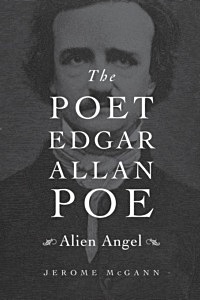 That these poems have never lacked a popular audience has been a persistent annoyance in academic and literary circles; that they attracted the admiration of innovative poetic masters in Europe and especially France—notably Baudelaire, Mallarmé, and Valéry—has been further cause for embarrassment. Jerome McGann offers a bold reassessment of Poe’s achievement, arguing that he belongs with Whitman and Dickinson as a foundational American poet and cultural presence.
That these poems have never lacked a popular audience has been a persistent annoyance in academic and literary circles; that they attracted the admiration of innovative poetic masters in Europe and especially France—notably Baudelaire, Mallarmé, and Valéry—has been further cause for embarrassment. Jerome McGann offers a bold reassessment of Poe’s achievement, arguing that he belongs with Whitman and Dickinson as a foundational American poet and cultural presence.
Not all American commentators have agreed with Emerson’s dim view of Poe’s verse. For McGann, a notable exception is William Carlos Williams, who said that the American poetic imagination made its first appearance in Poe’s work. The Poet Edgar Allan Poe explains what Williams and European admirers saw in Poe, how they understood his poetics, and why his poetry had such a decisive influence on Modern and Post-Modern art and writing. McGann contends that Poe was the first poet to demonstrate how the creative imagination could escape its inheritance of Romantic attitudes and conventions, and why an escape was desirable. The ethical and political significance of Poe’s work follows from what the poet takes as his great subject: the reader.
The Poet Edgar Allan Poe takes its own readers on a spirited tour through a wide range of Poe’s verse as well as the critical and theoretical writings in which he laid out his arresting ideas about poetry and poetics.
Jerome McGann is University Professor and John Stewart Bryan Professor of English at the University of Virginia.
“McGann succeeds in forcing us to rethink Poe’s poetry… Poe’s sound experiments, especially his strange variations on meter, deserve, as McGann shows by citing numerous rhythmic anomalies, to be taken seriously… In an age of predominantly, and purposely, flat and prosaic ‘free verse,’ mnemonic patterning is perhaps re-emerging as the emblem of poetic power. In this sense, Poe is once again Our Contemporary… In making the case for the close link between the poetry and the aesthetic theory, [McGann] succeeds admirably: Poe’s reputation as poete maudit belies the fact that here was a poet who knew exactly what he was doing.” — Marjorie Perloff, The Times Literary Supplement
Jerome McGann
The Poet Edgar Allan Poe
Alien Angel
256 pages
2014
Hardcover
Harvard University Press
€23.00
ISBN 9780674416666
literary criticism books
fleursdumal.nl magazine
More in: - Book Stories, Archive O-P, Archive O-P, Art & Literature News, Edgar Allan Poe, Poe, Edgar Allan, Poe, Edgar Allan, Tales of Mystery & Imagination

The hundred best books
First there’s the Bible,
And then the Koran,
Odgers on Libel,
Pope’s Essay on Man,
Confessions of Rousseau,
The Essays of Lamb,
Robinson Crusoe
And Omar Khayyam,
Volumes of Shelley
And venerable Bede,
Machiavelli
And Captain Mayne Reid,
Fox upon Martyrs
And Liddell and Scott,
Stubbs on the Charters,
The works of La Motte,
The Seasons by Thompson,
And Paul de Verlaine,
Theodore Mommsen
And Clemens (Mark Twain),
The Rocks of Hugh Miller,
The Mill on the Floss,
The Poems of Schiller,
The Iliados,
Don Quixote (Cervantes),
La Pucelle by Voltaire,
Inferno (that’s Dante’s),
And Vanity Fair,
Conybeare-Howson,
Brillat-Savarin,
And Baron Munchausen,
Mademoiselle De Maupin,
The Dramas of Marlowe,
The Three Musketeers,
Clarissa Harlowe,
And the Pioneers,
Sterne’s Tristram Shandy,
The Ring and the Book,
And Handy Andy,
and Captain Cook,
The Plato of Jowett,
And Mill’s Pol. Econ.,
The Haunts of Howitt,
The Encheiridion,
Lothair by Disraeli,
And Boccaccio,
The Student’s Paley,
And Westward Ho!
The Pharmacopœia,
Macaulay’s Lays,
Of course The Medea,
And Sheridan’s Plays,
The Odes of Horace,
And Verdant Green,
The Poems of Morris,
The Faery Queen,
The Stones of Venice,
Natural History (White’s),
And then Pendennis,
The Arabian Nights,
Cicero’s Orations,
Plain Tales from the Hills,
The Wealth of Nations,
And Byles on Bills,
As in a Glass Darkly,
Demosthenes’ Crown,
The Treatise of Berkeley,
Tom Hughes’s Tom Brown,
The Mahabharata,
The Humor of Hook,
The Kreutzer Sonata,
And Lalla Rookh,
Great Battles by Creasy,
And Hudibras,
And Midshipman Easy,
And Rasselas,
Shakespear in extenso
And the Æneid,
And Euclid (Colenso),
The Woman Who Did,
Poe’s Tales of Mystery,
Then Rabelais,
Guizot’s French History,
And Men of the Day,
Rienzi, by Lytton,
The Poems of Burns,
The Story of Britain,
The Journey (that’s Sterne’s),
The House of Seven Gables,
Carroll’s Looking-glass,
Æsop his Fables,
And Leaves of Grass,
Departmental Ditties,
The Woman in White,
The Tale of Two Cities,
Ships that Pass in the Night,
Meredith’s Feverel,
Gibbon’s Decline,
Walter Scott’s Peveril,
And—some verses of mine.
Mostyn Turtle Pigott
(1865-1927)
The hundred best books
• fleursdumal.nl magazine
More in: - Book Lovers, - Book Stories, Archive O-P, Archive O-P, Mostyn Turtle Pigott

De tijd
De tijd, m’n vriend, de tijd! Het hart verlangt naar rust.
De klok loopt door, daarvan ben ik mij zeer bewust…
Wij waren met z’n twee nog zo veel moois van plan,
Wij wilden léven maar – kijk aan – dit was het dan.
Je vindt op aarde geen geluk, misschien wat lucht,
Al jarenlang beraam ik moe en slaafs mijn vlucht,
Al jarenlang droom ik van een veel grootser lot,
Van verre oorden rijk aan werk en puur genot.
Aleksandr Poesjkin
(1799 – 1837)
Пора, мой друг, пора…
gedicht 1834
vertaling Paul Bezembinder, 2016.
(Meer over Paul Bezembinder is te vinden op zijn website: www.paulbezembinder.nl)
fleursdumal.nl magazine
More in: Archive O-P, Archive O-P, Poesjkin, Poesjkin, Aleksandr
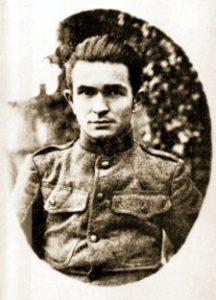
Aan Cendrars
Man loopt straat
luide stem tussen huizen
hij roept
klinkt klinker klaar
Blaise Blaise BLAIS –
se
gij zijt het
Cendrars
Paul van Ostaijen
(1896 – 1928)
Aan Cendrars
fleursdumal.nl magazine
More in: *Concrete + Visual Poetry K-O, Archive C-D, Archive O-P, Cendrars, Blaise, Ostaijen, Paul van, Paul van Ostaijen, Paul van Ostaijen
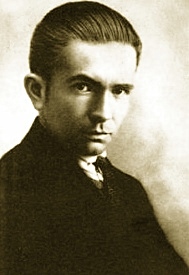
Marcel Schwob
Ik wil de wonderlijke wonden
van uw voeten zoenen, ik, de boetende,
en gij die reeds gekruisigd werd.
Ik weet ook gij
werd aan het kruis gekromd,
mijn stille kruistochtkind.
Gij zijt de stem van de Doper,
doch ik ben niet de Tetrarch.
Gij zijt het gans gebeuren.
U tegenover zal ik niet zondigen,
want uwe wonde ken ik,
zonder dat mijn hand hare kilte voelt.
Van uwe lippen wil ik de liefde drinken,
was ook uw lijf nog slechts een vreselijk offer,-
de melaatse kluizenaar in de woestijn.
Mijn handen zijn nog niet doorwond,
de koorden snijden enkel het vlees
van mijn arme armen.
Doch zeg slechts een woord, gekruisigde,
en de lichten in mij zullen zich omzetten
tot de kaarsen van het paradijs.
Paul van Ostaijen
(1896 – 1928)
Gedicht: Marcel Schwob
Marcel Schwob (1867 – 1905),
was a Jewish – French symbolist writer.
fleursdumal.nl magazine
More in: *Concrete + Visual Poetry K-O, Archive O-P, Marcel Schwob, Ostaijen, Paul van, Paul van Ostaijen, Paul van Ostaijen
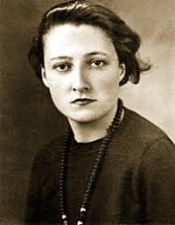
Esmeralda
Esmeralda
Esmeralda
une voix de femme crie appelle
hop hop
des écuyères
des équilibristes
au moment
dangerereux
un sourd galop
de cheval
une piste
un grand cheval noir…
Esmeralda galope nue sur un cheval fou
Esmeralda et son corps blanc de neige et sa longue large chevelure rousse
qui touche et s’emmêle à la crinière
à la queue
de lourd crin noir
Esmeralda
se couche
se cabre
se renverse
longue chevelure
et crinière
longue chevelure
et queue
plus longue que l’épaisse queue de crin
D’un claquement de fouet
Esmeralda
est debout sur le cheval
rutilante
de nudité
fraîcheur
Cette blancheur
trop blanche de rousse
et ses seins lourds et la corolle très large fendue
dans la blancheur un peu blessée décentrée
d’un si tendre et si fin bouton
Esmeralda
joue
dans une chambre toute capitonnée
Voilée de tissus vert tendre
elle est parfumée
elle sort du bain
elle joue parce que c’est l’heure pour elle de jouer de s’exercer
de plus en plus savamment
aux exercices
dans le petit (réduit)
attenant à sa chambre
Esmeralda est promise au plaisir
née pour le plaisir
sa tendre étoile
sous laquelle elle est née
tendres sont les hommes
Esmeralda saute du cheval
Et ne remonte plus à sa chambre = elle suit le cheval
et rentre à l’écurie
Tendre tendre
Esmeralda
rentre dans son box à côté de
son box en tout point semblable à l’autre
La journée commence
de grands claquements de fouets se font entendre
auxquels se joint le hennissement du cheval
un cri
Esmeralda lève-toi
ta chaîne à la mangeoire
un homme te regarde
assis sur un petit trépied
les genoux tu écartes nue mains sur
la cuisse
l’autre tient le fouet debout
Esmeralda tu seras sage aujourd’hui
– Comme toujours
– Non, pas « comme tous les jours »
folle que tu es
plus que tous les jours
Laure
(Colette Peignot 1903 – 1938)
Esmeralda
fleursdumal.nl magazine
More in: Archive K-L, Archive O-P, Laure (Colette Peignot)
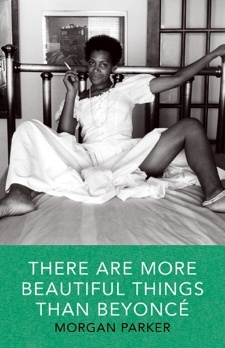 The only thing more beautiful than Beyoncé is God, and God is a black woman sipping rosé and drawing a lavender bath, texting her mom, belly-laughing in the therapist’s office, feeling unloved, being on display, daring to survive. Morgan Parker stands at the intersections of vulnerability and performance, of desire and disgust, of tragedy and excellence.
The only thing more beautiful than Beyoncé is God, and God is a black woman sipping rosé and drawing a lavender bath, texting her mom, belly-laughing in the therapist’s office, feeling unloved, being on display, daring to survive. Morgan Parker stands at the intersections of vulnerability and performance, of desire and disgust, of tragedy and excellence.
Unrelentingly feminist, tender, ruthless, and sequined, these poems are an altar to the complexities of black American womanhood in an age of non-indictments and déjà vu, and a time of wars over bodies and power. These poems celebrate and mourn. They are a chorus chanting: You’re gonna give us the love we need.
Morgan Parker is the author of Other People’s Comfort Keeps Me Up At Night (Switchback Books 2015), selected by Eileen Myles for the 2013 Gatewood Prize.
Her work has been featured or is forthcoming in numerous publications, as well as anthologized in Why I Am Not A Painter (Argos Books), The BreakBeat Poets: New American Poetry in the Age of Hip-Hop (Haymarket Books), and Best American Poetry 2016.
Winner of a 2016 Pushcart Prize and a Cave Canem graduate fellow, Morgan lives with her dog, Braeburn, in Brooklyn, New York. She works as an editor for Little A and Day One, co-curates the Poets With Attitude (PWA) reading series with Tommy Pico, and with poet Angel Nafis, she is The Other Black Girl Collective.
A TIME Magazine Best Paperback of 2017
A Paris Review Staff Pick
A Publishers Weekly Pick of the Week
A Buzzfeed “Most Exciting Book of 2017”
A VICE Most Anticipated Book
NPR.org’s “Poetry to Pay Attention To”
“[A] tremendous new collection.” VICE
Morgan Parker
There Are More Beautiful Things Than Beyoncé
Tin House Publisher
ISBN 978-1-941040-53-9
paperback, 96p,
2017, $14.95
fleursdumal.nl magazine
More in: - Book News, Archive O-P, Art & Literature News
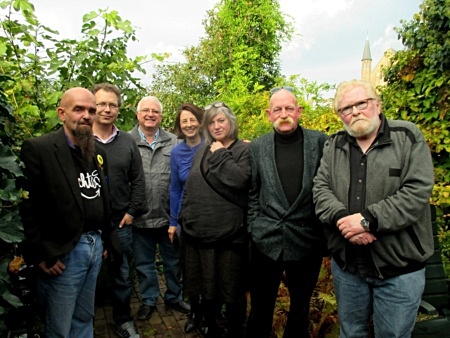
Vertaling van het gedicht Theater van Jef van Kempen in het Zuid-Afrikaans door Bernard Odendaal.
Eerder gepubliceerd door Carina van der Walt in: Versindaba – ‘n Kollektiewe weblog vir die Afrikaanse digkuns –
http://versindaba.co.za/2016/03/31/carina-van-der-walt-jeroen-bosch-se-skilderye/
Theater
Stel je voor: een toneel van dolende nachtvogels
boven een doorweekte woestijn, in een duister
hospitaal voor koortsige landlopers.
Stel je voor: een opera van rondborstige gedrochten,
verwekt in een glazen stolp, amechtig lispelend,
op kromme stelten strompelend, in een vuile
sneeuwjacht van de diepe winter.
Eind goed al goed vonden de trage doden hun draai
en bestegen, tegen de keer, het paard van Troje
en maakten hun dromen waar.
Jef van Kempen
(Uit de bundel ‘Laatste Bedrijf’ 2012)
Teater
Stel jou voor: ’n toneel van dolende nagvoëls
bokant ’n deurweekte woestyn, in ’n donker
hospitaal vir koorsige boemelaars.
Stel jou voor: ’n opera van rondborstige gedrogte
verwek onder ’n glasstolp, uitasem lispelend,
op krom stelte strompelend, morsig aan die
jag in die diepwintersneeuw.
Einde goed alles goed kry die trae dooies hul draai
en bestyg, dwarstrekkerig, die perd van Troje
en maak hulle drome waar.
Vertaling Bernard Odendaal (2016)
FOTO: v.l.n.r. Martin Beversluis, Desmond Painter, Bernard Odendaal, Carina van der Walt, Annelie David, Bert Bevers en Jef van Kempen (foto Nel van Kempen 2015)
fleursdumal.nl magazine
More in: Archive K-L, Archive O-P, Bernard Odendaal, Bevers, Bert, Beversluis, Martin, Carina van der Walt, Jef van Kempen, Kempen, Jef van, Literaire Salon in 't Wevershuisje, TRANSLATION ARCHIVE
Thank you for reading Fleurs du Mal - magazine for art & literature